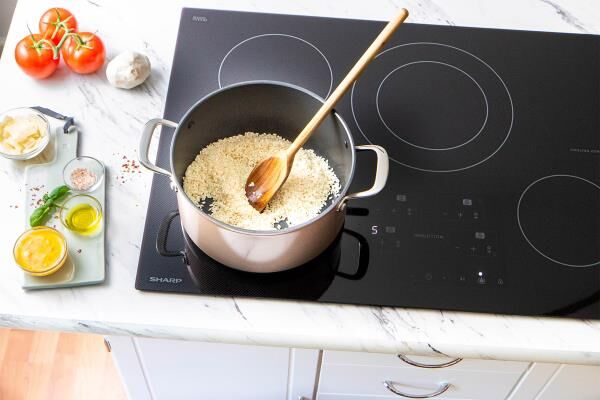(StatePoint) The best kitchen updates don’t just enhance the beauty of your space. They allow you to simplify your life, make better choices, and improve your relationship with your kitchen. And who knows? They may even make you a better cook! To that end, you may want to consider trading in your gas or electric cooktop for an induction model. If you’ve been keeping up with the Joneses and haven’t considered induction technology, that’s not surprising. While popular in Europe, adoption in the United States has been slower.
“Outdated misconceptions about the cost and reliability of induction cooking have prevented many American households from making the switch,” says Peter Weedfald, senior vice president of Sales and Marketing, Sharp Electronics Marketing Company of America. “However, induction technology offers quicker heating and boiling than gas or electric counterparts, more precise temperature control, easier cleanup, enhanced safety, and key eco-friendly perks.”
To help demystify induction cooking, Weedfald is offering some insights into how the technology works and how it can benefit your kitchen:
• Magnetic technology: Induction cooking skips the need to heat a burner, increasing the overall heating efficiency. Instead, it automatically detects when magnetic cookware is placed on the cooking zone. An electromagnetic field located below the cooktop transfers current (heat) directly to the cookware. The good news? You probably already own magnetic cookware. Many stainless steel, enamel-coated iron, and cast iron pots and pans are magnetic, and some manufacturers have added steel or iron plates to the bottom of ceramic, copper, aluminum, and other pans. If you put a magnet to the bottom of your cookware and it sticks, it’s magnetic and will work on induction. Concerned that one of your faithful pans won’t work? You can purchase an induction transfer plate, which is a simple steel disk that transfers heat to your non-magnetic cookware.
• Precise cooking: Some induction cooktops offer a wide range of temperature settings from low to high, as well as timers, for super-precise heating and overall faster boiling.
• Eco-friendly design: Induction cooking can help you reduce your carbon footprint at home. With induction, up to 90% of the energy consumed is transferred to food, compared to approximately 74% for traditional electric systems and 40% for gas, according to the Electric Power Research Institute.
• Cleaner indoor air: A study conducted for Southern California by the Environmental Health Perspectives found that residential natural gas cooking burners can emit air pollutants, including nitrogen dioxide, carbon monoxide, and formaldehyde. Unlike gas stoves, induction cooktops don’t release the airborne pollutants associated with burning natural gas.
• Safety first: Induction cooking carries less risk of burns and fires. Only the area the cookware occupies is transferring heat, not the surrounding area. Plus, the cooking zone stays cool even when turned on and is only activated when magnetic cookware is placed on top of it.
• Sleek design: Induction cooktops have a sleek glass-ceramic surface that not only looks great in any style kitchen but makes cleanup as simple as wiping down the surface.
• Cost: Upgrading to an induction cooktop was once expensive. But like with most innovations, not only has the technology substantially improved over time, the prices have dropped. For example, the 30-inch option from Sharp Appliances is commonly sold at just above $1,000.
To learn more about induction technology and smart home appliances, visit sharpusa.com.
Whether it’s time to replace your cooktop or you simply want to try something new, consider induction technology for an overall improved kitchen experience.

